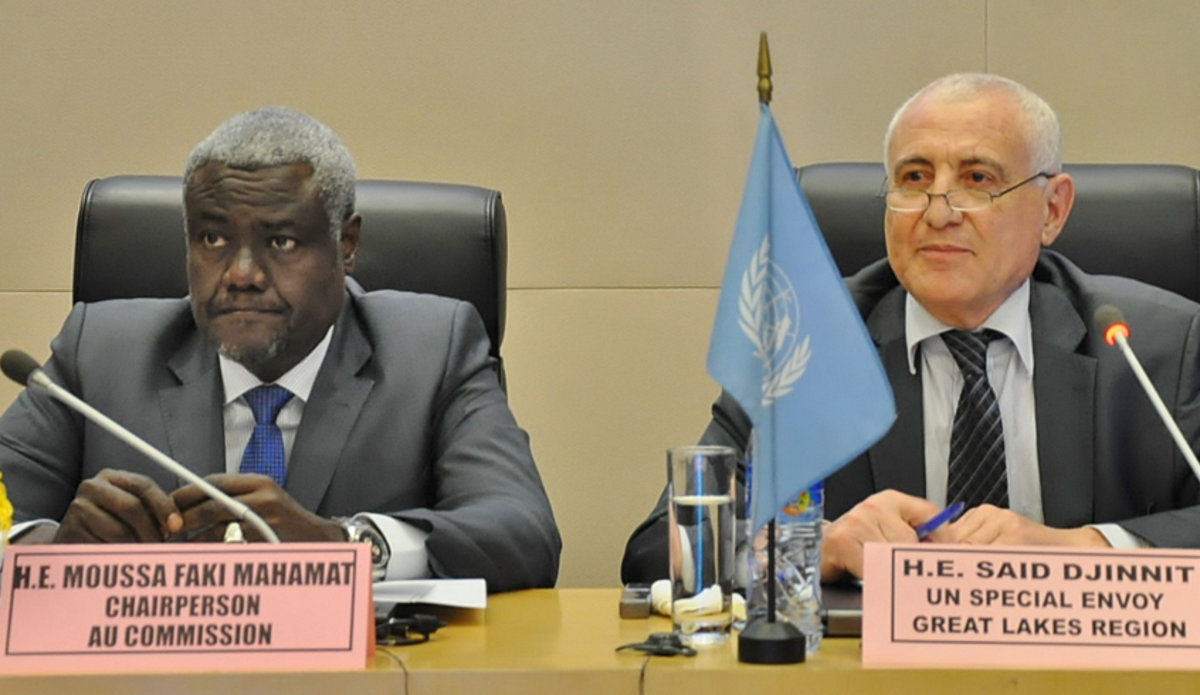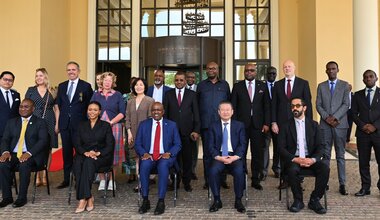Five years on, progress has been made in the implementation of the Peace, Security and Cooperation Framework for the DRC and the region, but challenges still remain
Addis Ababa (Ethiopia), 27 February 2018 – On the occasion of the fifth anniversary of the signing of the Peace, Security and Cooperation Framework agreement for the Democratic Republic of the Congo (DRC) and the region, regional stakeholders met in Addis Ababa, Ethiopia, in a two-day workshop on 26-27 February, to review the status of implementation of the Framework agreement, and to make recommendations on its continued and effective implementation as called for by the United Nations Security Council Resolution 2389.
The December 2017 Resolution calls on the United Nations Secretary-General “to engage in high-level dialogue, in collaboration with the AU, with the signatory states and Guarantor institutions of the PSC Framework, as well as key regional and international partners, to assess the progress, challenges and shortcomings in the implementation of the PSC Framework, and to present his vision, supported by concrete recommendations, to the Council in his next report, which would mark the fifth anniversary of the signing of the PSC Framework.”
The workshop brought together representatives of the signatory countries and the Guarantors of the Framework agreement, namely the United Nations (UN), the African Union (AU), the International Conference on the Great Lakes Region (ICGLR), and the Southern African Development Community (SADC), as well as experts and representatives of civil society organizations. High level representatives included Moussa Faki Mahamat, AU Chairperson; Said Djinnit, UN Special Envoy for the Great Lakes region; Basile Ikouebe, AU Special Envoy to the Great Lakes region; Jean-Claude Gakosso, Minister of Foreign Affairs of the Republic of Congo representing President Denis Sassou-Nguesso; and Wilbert Ibuge, representing SADC. There were also representatives of partner States to the Framework agreement, including Belgium, United States, France, United Kingdom, and the European Union.
The participants agreed that much progress has been made in the implementation of the Framework agreement. Among the achievements, the defeat of the former M23 rebel movement and the weakening of the Democratic Forces for the Liberation of Rwanda (FDLR) and the Allied Democratic Forces (ADF); the enhancement of confidence building among states through specific mechanisms on information sharing such as the Joint Intelligence Fusion Centre, the Expanded Joint Verification Mechanism and the Joint Follow up Mechanism on the ADF in addition to other bilateral security cooperation arrangements; important steps have been taken in the areas of economic cooperation and integration, translating into the Private Sector Investment Conference, which took place in Kinshasa, DRC, on 24-25 February 2016; and finally, increase in ownership of the Peace, Security and Cooperation Framework by the signatory countries, as evidenced in the convening of the seventh and eighth Summits of the Regional Oversight Mechanism in Luanda (Angola) and Brazzaville (Republic of Congo), on 26 October 2016 and 19 October 2017, respectively. Uganda is in line to host the next Summit later this year in Kampala.
Despite these notable achievements, ongoing and new challenges remain. Among them, the persistence of conflicts in South Sudan and the Central African Republic, as well as the emergence of political and electoral crises in the DRC and Burundi with dire consequences on the populations. Of note, over 11 million people are currently displaced in the region, including close to 5 million refugees and 7 million Internally Displaced Persons.
The participants deplored the dwindling funding and lack of durable solutions to address these crises. “Clearly, much more resolve and efforts need to be displayed to ensure that the commitments made under the Peace, Security and Cooperation Framework, together with other key regional instruments, such as the ICGLR Pact, are fully implemented to deliver their promises for lasting peace and stability to the people of the region. In this regard, resolving, as a matter of priority, the crises in Burundi and the DRC and conflicts in South Sudan and Central African Republic, is critical to create the conditions for the pursuit of efforts towards the full implementation of the Framework agreement,” Special Envoy Said Djinnit said in his opening remarks.
 UN
UN




